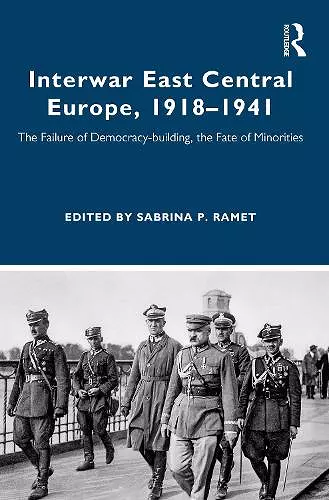Interwar East Central Europe, 1918-1941
The Failure of Democracy-building, the Fate of Minorities
Format:Hardback
Publisher:Taylor & Francis Ltd
Published:28th May '20
Currently unavailable, and unfortunately no date known when it will be back
This hardback is available in another edition too:
- Paperback£39.99(9780367135713)

This monograph focuses on the challenges that interwar regimes faced and how they coped with them in the aftermath of World War One, focusing especially on the failure to establish and stabilize democratic regimes, as well as on the fate of ethnic and religious minorities. Topics explored include the political systems and how they changed during the two decades under review, land reform, Church–state relations, and culture. Countries studied include Poland, Czechoslovakia, Hungary, Yugoslavia, Romania, Bulgaria, and Albania.
"Sabrina Ramet has assembled a team of highly respectable country specialists to offer a fresh and historiographically updated reading of interwar developments in East Central Europe. The volume is bookended by two excellent comparative and theoretically informed essays carefully weighing the multiplicity of factors contributing to the instability of the interwar regimes. As a result this survey succeeds admirably in producing a nuanced narrative and analysis." - Maria Todorova, University of Illinois at Urbana-Champaign, USA
Sabrina Ramet, together with a roster of other eminent scholars, has produced an exciting new history of interwar East Central Europe. The volume has a clear focus on the failure of democracy (1918 to 1941), and on the bedeviling issues of ethnic minorities and of peasants; the latter made up an overwhelming majority of much of the region's population. The book will be of great interest to political scientists and historians of East Central Europe, and of Europe more generally, and it is perfect for classroom use. - Irina Livezeanu, University of Pittsburgh, USA
Sabrina Ramet has assembled a team of highly respectable country specialists to offer a fresh and historiographically updated reading of interwar developments in East Central Europe. The volume is bookended by two excellent comparative and theoretically informed essays carefully weighing the multiplicity of factors contributing to the instability of the interwar regimes. As a result this survey succeeds admirably in producing a nuanced narrative and analysis.
Maria Todorova, University of Illinois at Urbana-Champaign, USA
Sabrina Ramet, together with a roster of other eminent scholars, has produced an exciting new history of interwar East Central Europe. The volume has a clear focus on the failure of democracy (1918 to 1941), and on the bedeviling issues of ethnic minorities and of peasants; the latter made up an overwhelming majority of much of the region's population. The book will be of great interest to political scientists and historians of East Central Europe, and of Europe more generally, and it is perfect for classroom use.
Irina Livezeanu, University of Pittsburgh, USA
...the strength of this collection is that its contributions are written by experts who speak the languages of the countries they discuss, an that numerous recent sources are drawn upon.
Nikica Barić, University of Zagreb, Croatia, Casopis za suvremenu povjest (Journal of Contemporary History)
Sabrina Ramet has assembled a team of highly respectable country specialists to offer a fresh and historiographically updated reading of interwar developments in East Central Europe. The volume is bookended by two excellent comparative and theoretically informed essays carefully weighing the multiplicity of factors contributing to the instability of the interwar regimes. As a result this survey succeeds admirably in producing a nuanced narrative and analysis.
Maria Todorova, University of Illinois at Urbana-Champaign, USA
Sabrina Ramet, together with a roster of other eminent scholars, has produced an exciting new history of interwar East Central Europe. The volume has a clear focus on the failure of democracy (1918 to 1941), and on the bedeviling issues of ethnic minorities and of peasants; the latter made up an overwhelming majority of much of the region's population. The book will be of great interest to political scientists and historians of East Central Europe, and of Europe more generally, and it is perfect for classroom use.
Irina Livezeanu, University of Pittsburgh, USA
This book is a welcome addition for scholars and students of east central Europe.
Susan Mikula, Benedictine University, Slavic Review
ISBN: 9780367135706
Dimensions: unknown
Weight: 1060g
340 pages